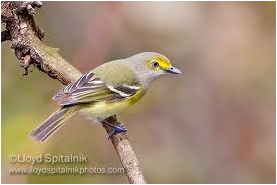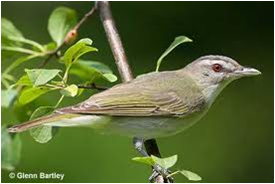Thrushes, Bluebirdsand Robins
•PhysicalCharacteristics
–Small with strong straight bills
–Squared or rounded tails
–Sexual Dimorphism and camouflage adolescents
•GeneralBehavior
–Generally Monogamous
–Very Territorial
Melodious
FamilyMimidae:Thrashers,Mockingbirds and Catbirds
•MediumSongbirds ranging from 8-12 cm long
•Diet-insectsand fruit
•Pairsoften stay together for more than one breeding season
•PhysicalCharacteristics
–Slender Bill
–Short, rounded wings
–Long Tails
FamilyVireonidae•Typicallydull plumage and greenish in color
•Eatmostly insects and some fruit
•Foundin broad-leaved forests and scrubs
•Hookedupper mandibles
Wood Thrush

http://roaneviews.com/?q=node/938
•Nest in lower perches such as saplings or bushes
•Physical Characteristics
–Pot Bellied
–Short Tail
–Large Head
–Brick red to brown back and cap
–Spotted/ striped chest
–Pink Legs
Hermit Thrush

•Nest on the ground or in low shrubbery
•Physical Traits
–Brow back and cap
–Reddish tail
–Distinct Spots on chin that get more blurred towards the chin and tummy
Eastern Bluebirds

•Identifiers
–Small, large eyes and round heads
–Slender, short bills
–Males have bright blue back with rust colored chest, sides and flanks
•Females are same colors but paler
•Behavior
–Males may squat and flutter pointed wings during mating season
–May be found in small flocks
American Robin
•Identifiers
–Black Head
–Grey back and wings
–Rusty orange breast
–White under-tail
–White and black streaked throat
--Nest in bushes and trees
Brown Thrasher

http://www.ellenmichaelsphotos.com/v/central_park_birds/brown_thrasher_3311.jpg.html
• Identifiers
–Long Tail
–Back and Head are brownish Red
–Striped and spotted from chin to belly
•Behavior
–Nest In shrubs, like thorned bushes
–Aggressively territorial
Northern Mockingbird

•http://www.allaboutbirds.org/guide/Northern_mockingbird/id/ac
•Identifiers
–Medium, Smaller than Thrasher
–Small heads with thin, slightly curved bill
–Primarily grey but darker on the top than bottom
–Have black tails and wing tips
–White wing patches
–Long Legs
–Wings are short, rounded and broad
•Behavior
–Aggressively territorial
–Easily seen perched openly on fence posts, branches, and telephone branches.
–Sing frequently
Grey Catbird

http://www.allaboutbirds.org/guide/Gray_Catbird/id/ac
•Identifiers
–Dusty Gray body with black cap and rusty rump
–Black, rounded tail
–Narrow, long beak
–Long legs
–Broad wings
•Behavior
–Keeps well hidden
–Prefers short flights among branches or just over vegetation, not likely to be found in open areas
–Male sings loud to claim territory, sings quietly when close to nest and female may sing back to him
White-Eyed Vireo

http://www.powdermillarc.org/highlights/2008/spring.aspx
•Identifiers
–Olive-Green back and cap
–Yellow mask
–White throat
–Two white wing bars
–White eyes
–Yellow sides
–Dark wing and tail
•Behaviors
–Secretive
–Found in overgrown fields and along edges of forests
Red-Eyes Vireo

http://www.birdzilla.com/bird-identification/which-bird-did-you-see/search-by-size/small.html
•Identifiers
–Olive green Back
–White underside
–Blue-grey cap
–White eyebrow with black stripe through eye
–Dark red eyes
•Behavior
–Sings continuously from forest canopy
•Fun Fact
–Kills larger prey by crushing it or beating it against a branch
Yellow Throated Vireo

http://leesbird.com/birds-world/fm/vireonidae/
•Identifiers
–Olive green head
–Bright yellow throat, breast and around eyes
–White belly
–Two white wing bars
–Thick Blue grey legs
–Hooked lower mandible

No comments:
Post a Comment